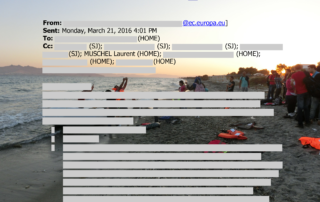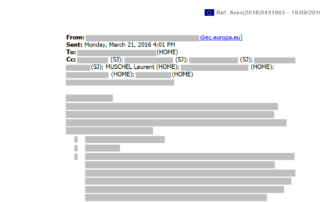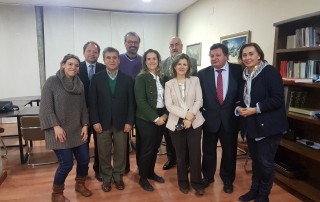EMPODERANDO AL PERIODISMO A TRAVÉS DEL DERECHO DE ACCESO A LA INFORMACIÓN
EL MANUAL ‘LEGAL LEAKS’ AYUDA A PERIODISTAS A OBTENER
INFORMACIÓN USANDO LAS LEYES DE ACCESO A LA INFORMACIÓN
Why is the right of access to information important for journalism?
A Guide for Journalists on How to Access Information
The Legal Leaks Toolkit, developed by Access Info Europe and n-ost, helps journalists access information using Access to Information laws. The Toolkit is available in a generic international version and can be adapted to the legal framework of any country. The existing national versions, translated into local languages, are available below. You can also read more below about our training programme and about how to contact
the Legal Leaks Help Desk.
Why do media experts think access to information is important?
Journalists, activists, and media experts speak about the importance of access to information in their daily work. Watch all interviews here!
That little detail in the relationship between journalists and sources, that little one, is so important that could change the way in which we tell stories.
It is extremely important that there is this mechanism that you can use as a journalist to say «Hang on a minute, you need to give us this, because we have a right to know».
It’s a great way to get stories, it’s a great way to fin out what governments in particular are doing, it’s a great way to find out where money goes, it’s a great way to prove accountability.
The right of access to information is very important for the journalists’ work; it’s important for everyday work, but it’s even more important for investigations.
Journalism is about investigation, it’s about asking questions; but it’s about documents as well, as a proof for questions, as a proof for answers
Basically, I need access to information to do my job as someone who is supposed to ensure the accountability of politicians, of public officials.
Cover photo: European Parliament via Flickr (CC BY-NC-ND 2.0)
ÚLTIMAS NOTICIAS SOBRE EMPODERANDO AL PERIODISMO
Greater transparency of Council legislative process, fundamental for representative democracy, says European Ombudsman
Madrid, 13 February 2018 – Access Info today welcomed the European Ombudsman recommendation that the Council of the European Union increase transparency of its legislative process in order to guarantee citizens’ right to hold their elected representatives to account and to participate in the democratic life of the EU. Two main findings of the Ombudsman’s inquiry into transparency of the
Secrecy over international relations trumps transparency of EU-Turkey deal
Madrid, 8 February 2018 - The General Court of the European Union has ruled that the public does not have the right to access the European Commission’s legal advice on the March 2016 EU-Turkey agreement on returning migrants and asylum seekers from Greece to Turkey. The Commission had applied a series of exceptions to documents requested by Access Info Europe,
The documents in dispute: The European Commission’s legal advice on the EU-Turkey deal
From 7 March 2016, the day when a pre-agreement with Turkey was reached, to 12 April 2016, when the deal was already under implementation, the European Commission consulted with its legal services on a wide range of issues related to the legality of the EU-Turkey agreement. These consultations resulted in a total of 11 documents – sometimes produced at late
European Commission formalises commitment to public travel expenses
Madrid, 2 February 2018 - The European Commission has formalised its commitment, first pledged in September 2017, to make public the travel expenses of the Commissioners: on 31 January 2018 the new Code of Conduct for the Members of the European Commission was published and it confirms that mission expenses will be published every two months. This commitment in the
Más de 50 iniciativas se inscriben en el Registro de Lobbies del Ayuntamiento en su primer mes de vida
La Vanguardia | 02/02/2018 Español - Más de 50 iniciativas se han inscrito en sólo un mes, el primero de vida, en el Registro de Lobbies del Ayuntamiento de Madrid, una herramienta que aprende de experiencias como la catalana, la pionera, con nueve lobbies inscritos en su primer año en funcionamiento. Leer más...
Encuentro Hispano-Chileno sobre Transparencia
Fecha: 01/02/2018 Lugar: Facultad de Ciencias de la Información de la Universidad Complutense de Madrid.





